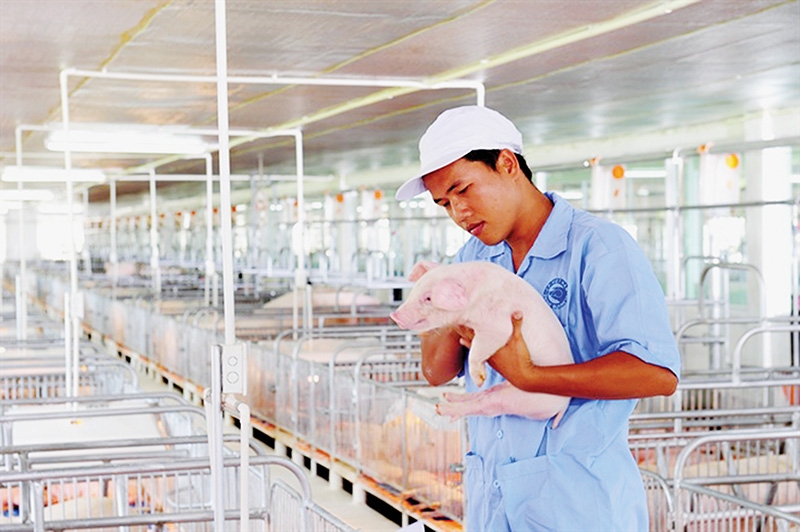Husbandry giants turn to breeding
 |
| Large livestock companies hold the key to the entire market, photo Le Toan |
The DHN Dak Lak Agricultural High Technology complex, funded by Dutch animal feed giant De Heus and local Hung Nhon Group, last week commenced construction in the Central Highlands province of Dak Lak. The project is expected to form a disease-free zone and provide high productivity pig and chicken breeds to the market.
The $66-million venture is expected to feed 2,500 grandparent and great-grandparent pigs, as well as 25,000 parent and gilt pigs to the market when it is launched. Moreover, in the next 5-10 years, the two companies will develop similar projects in provinces such as Dak Nong, Kon Tum, and Lam Dong.
The Dak Lak initiative raises total capacity of the chain to 10,000-15,000 great-grandparent pigs, and 100,000-200,000 grandparent breeds. The chain aims to enable the highlands to become a leading hub in supplying breeding stock to the whole country, as well as Southeast Asia and beyond.
The African swine fever (ASF) epidemic – which has killed around a quarter of pigs worldwide, around half in China, and nearly a quarter in Vietnam – has revealed many troubles for Vietnam’s low-quality and low-productivity husbandry industry.
The epidemic has also pushed up the price of pigs due to scant supply. The price of live hogs is hovering around VND80,000 ($3.50) per kg at present, hitting a peak of about VND100,000 ($4.30) in summer.
This has significantly enhanced the value of breeding stock. From nearly VND1 million ($43.50) per animal, costs have increased to VND3 million ($130) since the epidemic. In this context, big husbandry companies are strengthening the imports of grandparent and great-grandparent pigs to fill the shortage, as well as seize opportunities to control the market of breeding animals in the country.
In addition to De Heus and its Dak Lak project, movements are mostly being carried out by foreign-invested companies. Japfa Comfeed Vietnam, managed by JapfaComfeed Indonesia TBK, has imported 1,300 great-grandparent and grandparent pigs from Canada for a farm in the northern province of Yen Bai. A similar amount of pigs were also imported by Chinese investor New Hope for the north-central province of Thanh Hoa.
Previously, the country’s largest husbandry company C.P. Vietnam did its utmost to promote and support the government to import live hogs from Thailand, where its parent company is based, to stabilise prices in the country. Accordingly, tens of thousands of breeding animals have been imported or registered to be imported here over the first nine months of the year.
According to husbandry expert Duong Anh Chu, a handful of foreign-invested companies are dominating the breeding market in the same vein as they control the market for pigs, chickens, and animal feed.
“The breeding animals of companies are better than those of household farmers thanks to stronger genes and good vaccines. That is why household farmers have to buy breeding piglets from these companies. The bigger a company, the stronger hold they have on the breeding market,” Chu said.
In fact, the pig breeding market is dominated by husbandry companies, which captured 40 per cent of before the ASF outbreak and now hold as much as 60 per cent. Some 70-80 per cent of these companies are foreign-invested husbandry companies.
“Having control over breeding equals to dominance in the whole market because it is the most important factor in husbandry. In the future, if all husbandry companies like C.P, Japfa, CJ, Emivest, Greenfeed, and De Heus stopped selling their breeding stock and concentrated on closed production chains, farmers would have no breeding animals to get,” Chu asserted.
Therefore, Chu said, investing and expanding factories and projects in Vietnam are necessary to develop a high-tech agricultural sector. However, he advised against increasing dependence on foreign-invested companies in all aspects should not be promoted because it could be liable to kill off domestic production and husbandry at any time.
What the stars mean:
★ Poor ★ ★ Promising ★★★ Good ★★★★ Very good ★★★★★ Exceptional
Related Contents
Latest News
More News
- Hermes joins Long Thanh cargo terminal development (February 04, 2026 | 15:59)
- SCG enhances production and distribution in Vietnam (February 04, 2026 | 08:00)
- UNIVACCO strengthens Asia expansion with Vietnam facility (February 03, 2026 | 08:00)
- Cai Mep Ha Port project wins approval with $1.95bn investment (February 02, 2026 | 16:17)
- Repositioning Vietnam in Asia’s manufacturing race (February 02, 2026 | 16:00)
- Manufacturing growth remains solid in early 2026 (February 02, 2026 | 15:28)
- Navigating venture capital trends across the continent (February 02, 2026 | 14:00)
- Motivations to achieve high growth (February 02, 2026 | 11:00)
- Capacity and regulations among British areas of expertise in IFCs (February 02, 2026 | 09:09)
- Transition underway in German investment across Vietnam (February 02, 2026 | 08:00)

 Tag:
Tag:




















 Mobile Version
Mobile Version